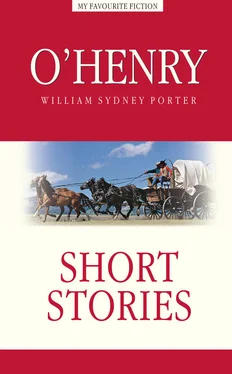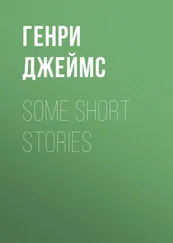“Eat Bricklets – They Fill Your Face.”
Violet blushed when she saw William Pry. William jabbed a lady in a black silk raglan in the ribs, kicked a boy in the shin, hit an old gentleman on the left ear and managed to crowd nearer to Violet. They stood for an hour looking at the man paint the letters. Then William’s love could be repressed no longer. He touched her on the arm.
“Come with me,” he said. “I know where there is a bootblack without an Adam’s apple.”
She looked up at him shyly, yet with unmistakable love transfiguring her countenance.
“And you have saved it for me?” she asked, trembling with the first dim ecstasy of a woman beloved.
Together they hurried to the bootblack’s stand. An hour they spent there gazing at the malformed youth.
A window-cleaner fell from the fifth story to the sidewalk beside them. As the ambulance came clanging up William pressed her hand joyously. “Four ribs at least and a compound fracture,” he whispered, swiftly. “You are not sorry that you met me, are you, dearest?
“Me?” said Violet, returning the pressure. “Sure not. I could stand all day rubbering with you.”
The climax of the romance occurred a few days later. Perhaps the reader will remember the intense excitement into which the city was thrown when Eliza Jane, a colored woman, was served with a subpoena. The Rubber Tribe encamped on the spot. With his own hands William Pry placed a board upon two beer kegs in the street opposite Eliza Jane’s residence. He and Violet sat there for three days and nights. Then it occurred to a detective to open the door and serve the subpoena. He sent for a kinetoscope and did so.
Two souls with such congenial tastes could not long remain apart. As a policeman drove them away with his night stick that evening they plighted their troth. The seeds of love had been well sown, and had grown up, hardy and vigorous, into a – let us call it a rubber plant.
The wedding of William Pry and Violet Seymour was set for June 10. The Big Church in the Middle of the Block was banked high with flowers. The populous tribe of Rubberers the world over is ram-pant over weddings. They are the pessimists of the pews. They are the guyers of the groom and the banterers of the bride. They come to laugh at your marriage, and should you escape from Hymen’s tower on the back of death’s pale steed they will come to the funeral and sit in the same pew and cry over your luck. Rubber will stretch.
The church was lighted. A grosgrain carpet lay over the asphalt to the edge of the sidewalk. Brides-maids were patting one another’s sashes awry and speaking of the Bride’s freckles. Coachmen tied white ribbons on their whips and bewailed the space of time between drinks. The minister was musing over his possible fee, essaying conjecture whether it would suffice to purchase a new broadcloth suit for himself and a photograph of Laura Jane Libbey for his wife. Yea, Cupid was in the air.
And outside the church, oh, my brothers, surged and heaved the rank and file of the tribe of Rubberers. in two bodies they were, with the grosgrain carpet and cops with clubs between. They crowded like cattle, they fought, they pressed and surged and swayed and trampled one another to see a bit of a girl in a white veil acquire license to go through a man’s pockets while he sleeps. But the hour for the wedding came and went, and the bride and bridegroom came not. And impatience gave way to alarm and alarm brought about search, and they were not found. And then two big policemen took a band and dragged out of the furious mob of onlookers a crushed and trampled thing, with a wedding ring in its vest pocket and a shredded and hysterical woman beating her way to the carpet’s edge, ragged, bruised and obstreperous.
William Pry and Violet Seymour, creatures of habit, had joined in the seething game of the specta-tors, unable to resist the overwhelming desire to gaze upon themselves entering, as bride and bridegroom, the rose-decked church.
Rubber will out.
At the hazard of wearying you this tale of vehe-ment emotions must be prefaced by a discourse on geometry.
Nature moves in circles; Art in straight lines. The natural is rounded; the artificial is made up of angles. A man lost in the snow wanders, in spite of himself, in perfect circles; the city man’s feet, denaturalized by rectangular streets and floors, carry him ever away from himself.
The round eyes of childhood typify innocence; the narrowed line of the flirt’s optic proves the in-vasion of art. The horizontal mouth is the mark of determined cunning; who has not read Nature’s most spontaneous lyric in lips rounded for the candid kiss?
Beauty is Nature in perfection; circularity is its chief attribute. Behold the full moon, the enchanting golf ball, the domes of splendid temples, the huckleberry pie, the wedding ring, the circus ring, the ring for the waiter, and the “round” of drinks.
On the other hand, straight lines show that Na-ture has been deflected. Imagine Venus’s girdle transformed into a “straight front”!
When we begin to move in straight lines and turn sharp corners our natures begin to change. The consequence is that Nature, being more adaptive than Art, tries to conform to its sterner regulations. The result is often a rather curious product – for instance: A prize chrysanthemum, wood alcohol whiskey, a Republican Missouri, cauliflower au gratin, and a New Yorker.
Nature is lost quickest in a big city. The cause is geometrical, not moral. The straight lines of its streets and architecture, the rectangularity of its laws and social customs, the undeviating pavements, the hard, severe, depressing, uncompromising rules of all its ways – even of its recreation and sports – coldly exhibit a sneering defiance of the curved line of Nature.
Wherefore, it may be said that the big city has demonstrated the problem of squaring the circle. And it may be added that this mathematical introduction precedes an account of the fate of a Kentucky feud that was imported to the city that has a habit of making its importations conform to its angles.
The feud began in the Cumberland Mountains between the Folwell and the Harkness families. The first victim of the homespun vendetta was a ’possum dog belonging to Bill Harkness. The Harkness family evened up this dire loss by laying out the chief of the Folwell clan. The Folwells were prompt at repartee. They oiled up their squirrel rifles and made it feasible for Bill Harkness to follow his dog to a land where the ’possums come down when treed without the stroke of an ax.
The feud flourished for forty years. Harknesses were shot at the plough, through their lamp-lit cabin windows, coming from camp-meeting, asleep, in duello, sober and otherwise, singly and in family groups, prepared and unprepared. Folwells had the branches of their family tree lopped off in similar ways, as the traditions of their country prescribed and authorized.
By and by the pruning left but a single member of each family. And then Cal Harkness, probably reasoning that further pursuance of the controversy would give a too decided personal flavor to the feud, suddenly disappeared from the relieved Cumberlands, baulking the avenging hand of Sam, the ultimate opposing Folwell.
A year afterward Sam Folwell learned that his hereditary, unsuppressed enemy was living in New York City. Sam turned over the big iron wash-pot in the yard, scraped off some of the soot, which he mixed with lard and shined his boots with the com-pound. He put on his store clothes of butternut dyed black, a white shirt and collar, and packed a carpet-sack with Spartan lingerie. He took his squirrel rifle from its hooks, but put it back again with a sigh. However ethical and plausible the habit might be in the Cumberlands, perhaps New York would not swallow his pose of hunting squirrels among the skyscrapers along Broadway. An ancient but reliable Colt’s revolver that he resurrected from a bureau drawer seemed to proclaim itself the pink of weapons for metropolitan adventure and vengeance. This and a hunting-knife in a leather sheath, Sam packed in the carpet-sack. As he started, Muleback, for the lowland railroad station the last Folwell turned in his saddle and looked grimly at the little cluster of white-pine slabs in the clump of cedars that marked the Folwell burying-ground.
Читать дальше
Конец ознакомительного отрывка
Купить книгу












